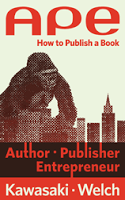How to Edit Your Book - Method 4: Professionals

This chapter
explains how to transform your self-edited manuscript into a finished
manuscript. A high-quality book requires extensive testing and copyediting. You
can get these processes done without a traditional publisher, but you
cannot eliminate them. Your goal is a book that looks and feels as good as any
book from a big-time, traditional publisher.
For
all the goodness of crowdsourcing, you still need someone to review your
manuscript with a magnifying glass and a professional eye to optimize your
content and to kill virtually every typographical, grammatical, and factual
error.
You
might not need a content editor if you have enough smart, hardcore voluntary
readers, but the probability that you will find every spelling and grammatical
mistake is zero. Word and other word processors may even introduce typos
and grammatical mistakes:
I have
a spelling checker,
It
came with my PC.
It
plane lee marks four my revue
Miss
steaks aye can knot sea.
Eye
ran this poem threw it,
Your
sure reel glad two no.
Its
vary polished in it's weigh.
My
checker tolled me sew.
A
checker is a bless sing,
It
freeze yew lodes of thyme.
It
helps me right awl stiles two reed,
And
aides me when eye rime.
("Candidate
for a Pullet Surprise," http://grammar.about.com/od/spelling/a/spellcheck.htm by
Mark Eckman and Jerold H. Zar. Hat-tip to Bob Soltys for this pointer.)
The
going rate for copyediting is $35 per hour, and copyeditors can work their
magic at the rate of roughly ten pages per hour (although this can vary
depending on the complexity of the material), so you'll pay approximately
$1,000-$1,500 for a three-hundred-page manuscript. This is one of the dumbest
places to try to save money, because poor copyediting destroys the quality of
your book.
One of
the challenges of hiring a copyeditor is figuring out if he or she is any
good-particularly for your first book. Here are four ways to find a good one:
* MCAT.
Rachelle Mandik was the copyeditor for What
the Plus! and APE, and
she put together a test called the Mandik Copyediting Aptitude Test (MCAT).
It's an early version of the preface of APE with Rachelle's corrections. Give copyeditor
candidates the document and compare their corrections to Rachelle's to
determine how good they are. It's not a foolproof instrument, she cautions, but
it's definitely a good place to start, especially for nonfiction. The document
is at APETheBook.com.
* Authors. Ask
authors for their recommendations. This pitch would work on me: "Dear Guy,
I loved your book. May I ask who your editor and copyeditor were? I'd like to
hire them to help me with my book."
* Moonlighters. Many
content editors moonlight as independent consultants, so you may be able to
hire the kind of editor you would have gotten at a traditional publisher anyway.
* Social-media referrals. Ask
for referrals on Google+, Facebook, Twitter, and LinkedIn. I've found many good
contractors and vendors using social media.
* Websites. Use
a website like Guru http://www.guru.com/ or
Elance https://www.elance.com/ to
find independent contractors.
Edit911 http://edit911.com/ has
an interesting model: it helps you hire PhDs. These sites enable customers to
rate independent contractors just as eBay and Amazon enable customers to rate
vendors. Serious independent contractors care a lot about their ratings.
Another
kind of website to use, though not strictly for finding editors, is Task Rabbit https://www.taskrabbit.com/ or
Amazon Mechanical Turk https://www.mturk.com/mturk/welcome. You
post a task on these sites, and people submit bids to complete them. For
example, as mentioned earlier, APE contains approximately four hundred
hyperlinks. In order to check them all, we posted a project to Task Rabbit, https://www.taskrabbit.com/virtual/t/checking-for-bad-hyperlinks-and-find-the-easter-eggs, and
in twelve hours there were forty-one bids. We accepted one bid for $36, and we
had a complete test of all the links less than twenty-four hours after the original
post.
The Kirkus Solution
While
writing APE, I learned that Kirkus Book Reviews http://www.kirkusreviews.com/, the
book-review magazine and website, offers three editorial services https://www.kirkusreviews.com/author-services/editorial/book-editing/:
* Collaborative Editing. This
service focuses on content editing and examines tone, organization, voice,
characterization, dialogue, and clarity.
* Copyediting.
Kirkus copyeditors go through your manuscript line by line to fix typical
copyediting issues such as grammar, spelling, and punctuation.
* Professional Editing. This
package includes a consulting session and three rounds of editing that includes
both collaborative editing and copyediting. At the end of the process your
manuscript should be ready to publish.
We
have not used these services, but Kirkus is worth looking into if you're on a
tight budget. You can check its prices at the Kirkus website.

Summary
I
enjoy the editing stage of writing a book the most. My goal is to produce the
best book ever about a topic, so when people point out content or copyediting issues,
I rejoice. There are four ways to obtain editing input, and I suggest that you
use them all to produce something that you'll be proud of.
Guy Kawasaki has written 12
books, 10 of which were traditionally published. His newest book is APE:
Author, Publisher, Entrepreneur - How to Publish a Book, which helps people
understand how and why to self-publish.
APE: Author, Publisher, Entrepreneur - How to Publish a Book, by Guy Kawasaki
and Shawn Welch, is available as an eBook ($9.99) and in paperback ($24.99).
Visit http://apethebook.com/








Published on September 22, 2013 19:00
No comments have been added yet.



